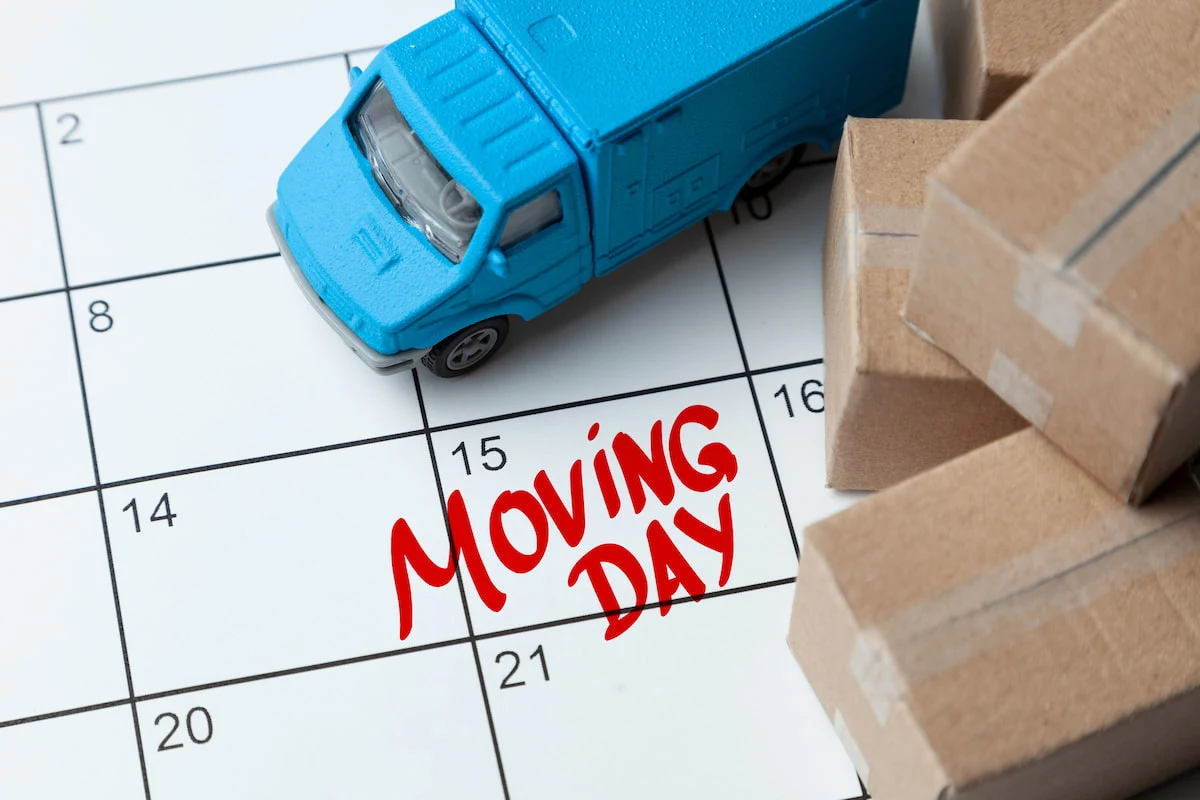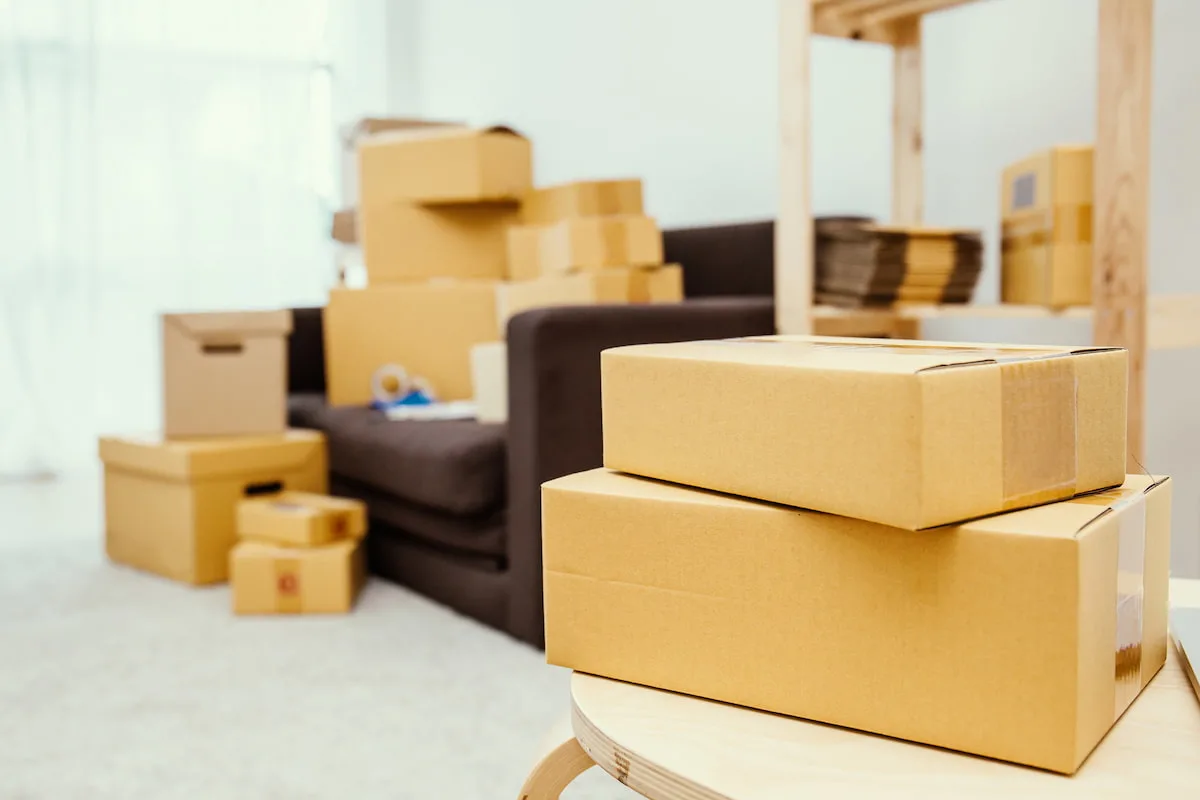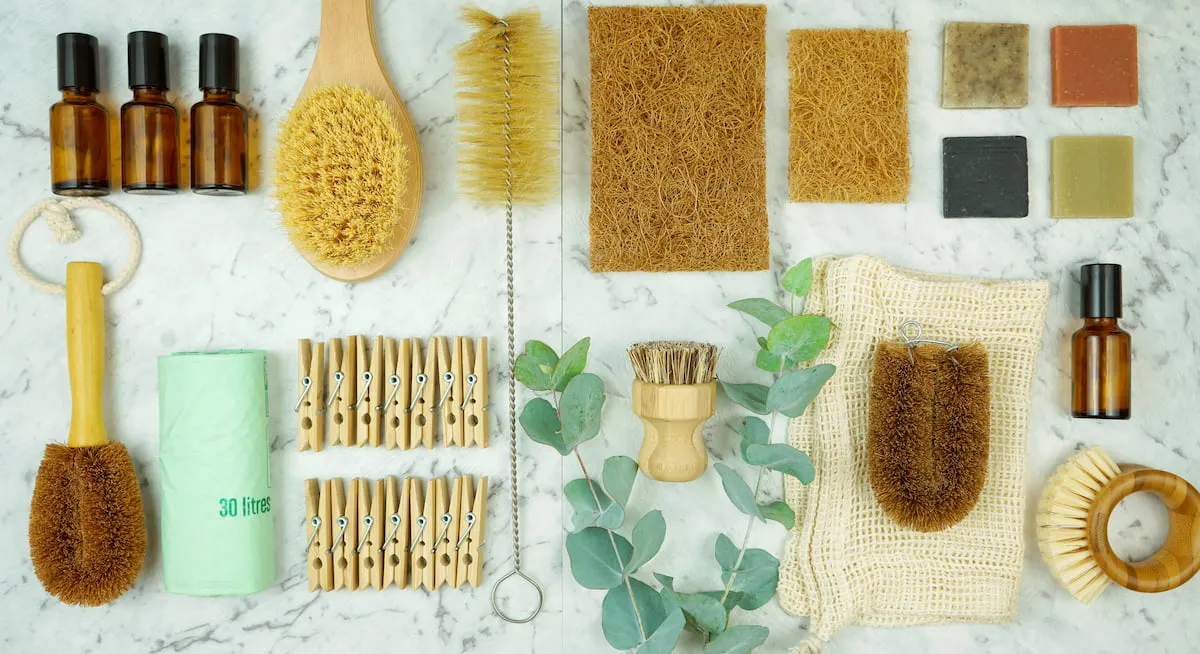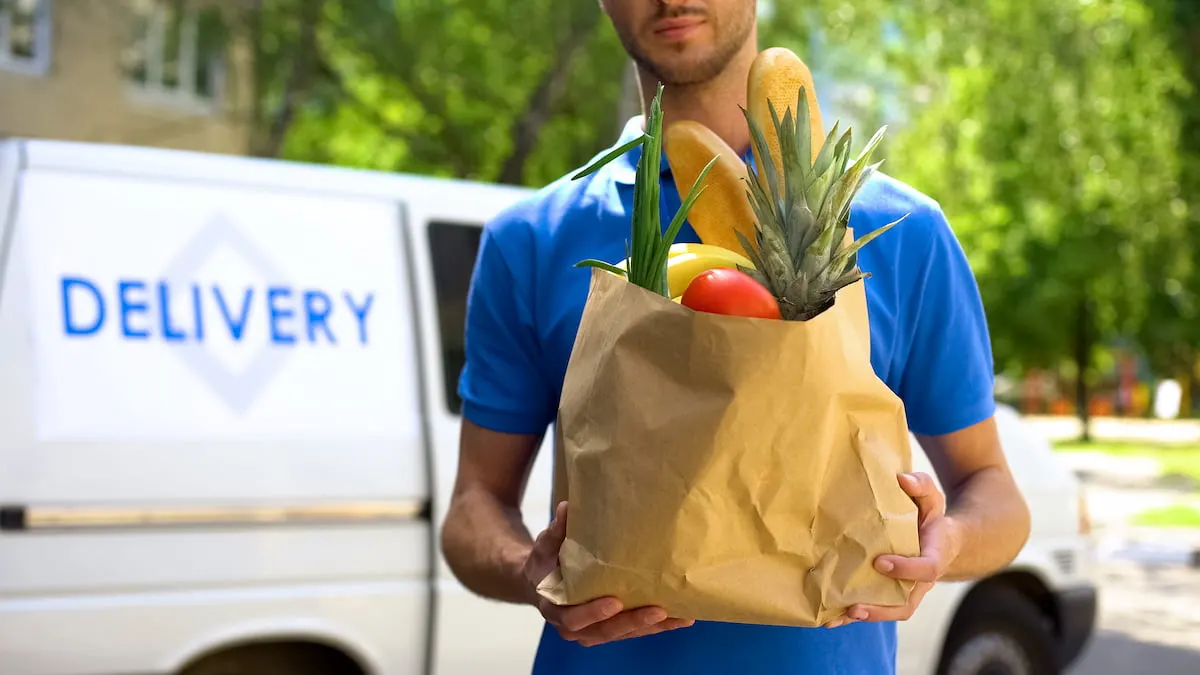If you are moving home soon you’ll know just how daunting the process can feel. There are a million and one things to remember and it can become overwhelming very quickly.
But never fear! I have created this detailed checklist to help you have a successful move into your new place in the UK, so you can begin your fresh start as seamlessly as possible.
This moving checklist covers everything from changing over utilities and packing to your first day essential tasks in your new home.
Disclaimer: Hi! this post may contain affiliate links which will take you to online retailers that sell products and services. If you click on one and buy something, I may earn a commission, see my Affiliate Disclosure for more details.
It’s split into two sections – ‘Before You Move’ and ‘After You Move’, to help you navigate both processes.
Get your pen and paper ready (or simply save this article to refer to again and again during your move), and let’s get started…
Before You Move

Before you move house you will be itching to start the process, wanting to be in your lovely new home as soon as possible.
It’s a great time to redirect that energy into a series of tasks that will make sure your moving process goes as smoothly as possible. Here is a helpful list of the things you’ll need to do before you move.
Change Over Your Utilities/Bills
Changing over your utilities ahead of time is a great first step to take before you move. This will save you stress down the line, and help keep you organised.
Make sure you contact the companies you currently have your utilities with and let them know you will be moving house. Provide your move-in date and begin the process.
It’s a good time to start researching new service providers and to decide whether you would like to switch when in your new house for better deals.
Here is a list of people you will need to contact/ things to check:
- Contact your gas, water and electric service providers.
- Look at home insurance companies and decide whether to stay with your current provider or to go for a better deal in your new house.
- Check if your new house is set up with an alarm system, and contact the company to provide your details.
- Notify the council that you will be moving, so they can recalculate your council tax ahead of time.
Change of Address Tasks
There are a number of things you will need to do when you change your address.
You’ll need to call and notify the following of your upcoming change in address:
- Contact the HMRC to let them know if you’re moving.
- DVLA to update your driving licence. Don’t forget to do this, as you will need a new driving licence issued. A driving licence with an incorrect/old address will be invalid.
- Your employer – make sure you let work know when you will be moving, so HR can update your employee records.
- Doctor and dentist – it’s really important to keep your records up-to-date with healthcare practitioners. If you are moving out of a catchment area and need to switch GP surgery get this organised ahead of time for you and your family.
- Bank – let your bank know when you will be changing address so they can update their records.
- Insurance companies – if you have any personal insurance, pet insurance, car insurance or home insurance, make sure you let them know you will be changing address.
- Postal service – let your postal service know you will be changing address so they can set up a postal redirect for your post.
Also don’t forget to register to vote in your new area, and get set up on the electoral roll.
Set Up a New Internet Provider
Getting your internet set up ahead of time ready for your move-in date will save you a headache on your moving day.
Don’t leave you and your family without the internet by skipping this step. This is essential for those who work from home or attend online education classes.
Setting up with an internet provider can take some time, so make sure you do this well in advance. It’s best to ensure this is sorted two to three weeks in advance. Do your research and find a good deal!
Register To a New Doctor
If you are moving out of the catchment area for your current GP surgery then you will need to register with a new one.
Make sure you get in touch with the GP surgery in your new area ahead of time, and register.
This is really important for everyone in your family, as you don’t want to have any issues if someone falls ill.
A good alternative is Babylon Health, they have an NHS service as well as a private so it’s a great stop-gap or permanent doctors choice.
Important Documents
Gathering and organising all of your important documents ahead of time will be a lifesaver during the stressful move process.
You want to make sure you have everything filed and organised, so nothing is lost in the move. Things like medical records, birth certificates and passports need to be kept really safe and organised.
If you have a big family, sorting this out is so vital, to make sure everyone’s records are properly kept.
Arrange Leave From Work
Make sure you notify your employer ahead of time of your moving date and you book the appropriate amount of leave from work.
If you are unsure of your exact move-in date let your employer know and you may be able to work out a flexible annual leave date.
If in doubt, and you have the holiday days spare, book the whole week off that your move-in date is expected to fall within. You can use the extra time to pack/unpack either side of the move-in date.
Give Notice if Renting
If you are renting you will need to give appropriate notice to your landlord of when you expect to move out.
Double-check your renting contract and make sure you are clear on the amount of notice required. For some this will be one month, for others, it can be up to three.
It’s best to be clear on this, to avoid stress and confusion at the last minute.
Maintenance on New Home/Old Home
You may need to organise maintenance and cleaning on both your new and current home.
Book a cleaner for your house and for your new house to help you save on extra time and effort at either end of moving. The last thing you want is to have to clean both houses yourself, as this can be stressful and time-consuming. Shoe-horning two deep cleans into your moving schedule are unrealistic for many.
You will also need to consider any home improvements that either home might need, and book a maintenance company accordingly. Any repairs, like issues with plumbing or a boiler maintenance check, need to be sorted in advance.
Book a Moving Truck

Booking your move with a moving company in advance is an essential part of the moving process. You want to make sure you can get a slot with a reputable company, which you can double-check and confirm with closer to the time.
Shop around for good deals, but beware of companies with super low prices. You don’t want last-minute cancellations.
It’s best to get a quote from a reputable company and go from there.
Book Childcare and Pet Care
Making sure children and pets will be out of the way of the movers is key to a successful moving day.
Pets and small children can be injured during the moving process, as people will be carrying heavy furniture in and out of the homes. You don’t want anybody underfoot during this transition.
Moving can also be a stressful time for both pets and children, and they will need to adjust in the new home once everything has settled and is quiet.
Book your childcare and pet care in advance and take them either very early on the morning of the moving day, or even the night before.
You yourself will need a good solid night’s rest the night before, as it will be a long and taxing day. Sometimes having the kids and pets away for the night makes for a more restful sleep without interruptions.
Moving Insurance
Getting some moving insurance is an excellent tip to follow, to ensure your items and home are protected in case of damage.
There is nothing worse than long, heavy scratches over a wooden floor, or lost or broken valuables, with no funds to fix the issues. I’ve even seen someone moving truck catch fire on my street and lose all their belongings.
When booking your moving insurance shop around for a good deal, make sure you fully read the fine print and understand what you are covered against.
Then take photos and make sure they are dated, of all of the items for the move. Organise and catalogue these photos in case of damages, as proof for the insurance company in the event of a claim.
Decluttering
Before you start the packing process it’s a great time to declutter your house.
Sort through everything and begin to throw away what you no longer need.
Start by sorting one room at a time, and gradually moving through the home to declutter the space. Don’t forget the attic (if you have one) – there’s often way more up there than we realise. It’s easy to accumulate clutter over the years, especially if you have a family, and you don’t want to take it all with you into a new home.
I suggest listening to decluttering themed podcasts whilst you work, to inspire you and help you decide what should stay and what should go.
Here are some ideas of things that may need decluttering:
- Kitchen: old tupperware that’s broken or unused, old pots and pans, mismatched sets of cutlery, chipped cups and mugs, multiple sets of wine glasses that aren’t used, old dish towels, old spice and herb pots.
- Bathroom: old towels that are wearing thin, an old bath mat, old shower curtain, old toilet brush, half used products that have been sitting on the shelf for years, dusty unused cleaning supplies.
- Bedroom: old bed sheets and linen, old clothes that you no longer wear, dusty curtains, unsushed decorative cushions, clutter in drawers.
Packing

After decluttering the next step is packing. Approaching the packing in an organised clear way will save you stress down the line.
Here are some steps to follow when packing, to ensure a smooth process:
- Take photos of all of your items and create an inventory. Store them in a folder on your phone, to stay organised. This is especially good for valuables or delicate items, so you have a record of their condition prior to moving in the event of a moving insurance claim.
- If you will be taking apart furniture, keep all of the screws and bolts in a bag and tape it to the underside of the piece. This will make it much easier on the other side when unpacking and putting furniture back together.
- Label all of your packing boxes clearly. Include the name of the room/area the stuff came from, and start a numeric system of what should be unpacked first.
- Protect your flooring on the moving day with cardboard or sheets to prevent scuffs on the floor. Buy these bits in advance so you have something to lay flat.
- Don’t buy perishable food in the week leading up to your move. Instead eat your way through your cupboards, fridge and freezer.
- Defrost your fridge and freezer before you move them. Allocate a few days to this, to ensure it is done correctly and the appliances aren’t damaged during the move.
- Do your laundry ahead of time – nobody wants to take a big bag of unclean clothes into their new home!
- Label spare keys and window keys and keep them in a drawer in your kitchen for the new owners. This is a great way to stay organised and ensure any keys aren’t forgotten or lost during the move.
- Keep your documents and valuables in a bag to keep on you the day of your move. It’s best to keep the most important things with you, and to not have them lost on a moving truck.
It’s best to start packing a few weeks in advance and to plan a system for unpacking. Add numbers to your boxes and keep a written note on your phone, so you can stay on top of things on the other side.
First Day Essential Items

Many forget about the key essential items they will need for their first day in their new home. Often the home you move into will be completely empty, and you won’t even have toilet paper on hand.
Here are some first day essential items to pack in advance before your move, to ensure your first day goes as smoothly as possible:
- Household essentials – you’ll need some snacks, packaged sandwiches, water bottles and a change of clothes that aren’t packed away so you can easily grab them.
- Toilet paper – this is a must! There’s nothing worse than needing the bathroom in an empty house.
- Shower curtain (if needed) – often the previous owners will have taken or thrown away their shower curtain, which will leave the bathroom very wet if you need to take a shower.
- Toiletries – make sure you have some travel sized shampoo, conditioner and body wash to hand for your first shower in the new home.
- Towels – make sure you take an unpacked towel for each family member, and a hand towel for the kitchen.
- Light bulbs – often the new home will be without light bulbs, leaving you in a sticky situation when the sun goes down. Pack some in advance to use immediately when you move in.
- Tea towels – for general cleaning or mopping up spills.
- Basic cleaning supplies – even if you booked a clean for the new home prior to moving in, it’s best to have some basic cleaning supplies on hand in case anything needs a quick extra clean.
- Bed linens – make sure you have washed and dried bed linens ready to make the beds on your first day.
- Basic tools – there may be loose screws in a kitchen cupboard, or a door handle that needs fixing on your first day in. Make sure you have some basic tools to do any quick fixes before unpacking your stuff.
- Laundry detergent – having a bottle of laundry detergent ready to go in your new home will stop any unwanted piles of washing building up. Your moving day clothes will likely be grimey after the long move, and you’ll want to wash up.
After You Move
After your big move there are several things you will need to sort out on your very first day/week in the new home.
Staying organised and being prepared for what needs to be done will make the first few days in your home as easy as possible.
First Day Essential Tasks
The first day in a new home is super exciting, and often a few essential tasks will fall to the wayside.
Here is a list of what you will need to sort on on your first day in a new home, to keep you on track:
- First aid kit – get together a first aid kit and put it somewhere visible. Make sure all of your family members know where it is. During the moving process it’s likely bumps and scratches, or even splinters may happen.
- Carbon monoxide detectors – you’ll need to locate these in your new home and test them. Replace any batteries and make sure they are operational.
- Fire extinguishers – make sure you locate the fire extinguisher in the house, or purchase one if there isn’t one.
- Smoke detectors – locate and test the smoke detectors and make sure to replace the batteries if needs be.
- Home security system – locate the home security system if there is one and file the paperwork.
- New locks – speak to a locksmith and arrange for your locks to be changed.
- Water meter – locate the water meter and take a reading, submit this.
- Circuit breaker box – locate the circuit breaker box. If this is in a dark place like a cellar make sure you have a torch to hand, or that you can use your phone light torch to light the way.
- Main water shut off valve – locate the water valve, in case you need to shut it off in an emergency.
- Water heater – find your water heater/boiler and check when it was last serviced.
- Gas and electricity meters – take readings from your gas and electricity meters, submit these to your provider.
- Warranties/instruction manuals on electrical items – locate any paperwork for the electrical items in the house and file this with your important documents.
- Any paint in storage to cover scuff on the walls – looking for spare paint in storage (maybe in a garage or shed) is a great thing to do on your first day, as there will likely be scuffs from moving in furniture that need painting over.
- Find out whether there are spare kitchen or bathroom tiles in storage and which company they came from. You never know when one might crack and you’ll need to replace it.
- Return your house key to the old home/ to your estate agent to hand over to the new owner.
Garbage
Once you are in the new house you should make time to find out your bin day/garbage system.
Often this will be on a leaflet somewhere in the important documents for the house, or you can check this online with your local council.
This is really important, as bins fill up quickly, and you don’t want to miss a week of disposal. After moving it’s likely you will have some increased waste, so it’s key you get it taken away.
Unpacking
Before you unpack make sure you walk around the new home and get a good feel for the layout. Make a note of electrical sockets, phone lines, light switches etc, so you know where everything is before your furniture covers it up.
Unpack following the numerical system/labels you used to label your boxes. It’s best to get the whole family involved and tackle the most important rooms.
If anything has been broken or lost you will need to make a claim on your moving insurance. Refer to your catalogue of photos on your phone and provide these when making a claim.
Food Delivery

Organise a food delivery for your new home, to save you having to go out food shopping. Get a next day delivery and stock up on all of the essentials.
You’ll likely be very busy in the new house and won’t have time to fill the cupboards. Book in a delivery so you don’t have to worry.
I hope you found this moving into a new house checklist helpful and you now feel confident to begin planning your moving process.
Feel free to refer back to this article and keep it as your personal checklist to help your moving process go as smoothly as possible.

Kat
Hi, I'm Kat, an Australian that moved to London in 2013 to start a new adventure. What a roller-coaster that was! I love helping others move to the UK and people explore the world! I’d be honoured if you’d say, “Thanks!” with a £3 coffee on Ko-fi.

